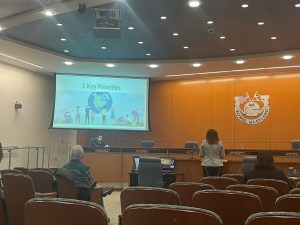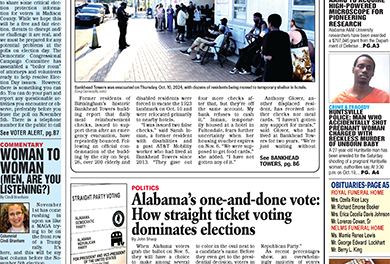By John Little,
Special to the AFRO
The environmental committee for the City of Bowie wants to expand an existing food scrap collection service to the entire city over the next decade, which could reduce the cost of trash collection, while also improving the city’s environmental profile.
Currently, almost 300 of the city’s nearly 21,000 households participate in food-scrap collection. In the pilot program, which began in 2017, the city provides bins and compostable bags to the households in the program and picks up the bags once a week. The food scraps are used to create compost, which is sold as a fertilizer in stores across Prince George’s and Montgomery Counties.
When the pilot program started, nearly eight tons of food scraps were collected, according to City Sustainability Planner Ashleigh Diaz. That collection number has since increased to 75 tons. “There were 68 people (program participants) when I started this position,” Diaz said. “I now have just shy of 300.”
At a City Council meeting earlier this month, Abby Snyder, chair of the Environmental Advisory Committee, said reducing waste is the Committee’s “first and biggest” priority. And expanding the food scrap program will help achieve that goal.
“Having (food scrap pickup) easily accessible, especially for those not thinking about their impact on the environment,” Snyder said, will likely have residents “more inclined to be recycling those food scraps in a much better way than letting them rot in a landfill and create methane emissions.”
Snyder also wants the city to designate more food scrap drop off sites to include residents for whom pickups are unavailable. “We’re really hopeful” about the “expansion of the city-wide drop offs by the end of the year,” Snyder said.
A larger food scrap program can reduce the expense of trash collection in several ways. Currently, the city picks up trash twice a week and sends out as many as four trucks each week: two a week for trash, one for recyclables and one to the homes that participate in the food scrap program. “We are spoiled in the city of Bowie having twice a week (trash) pickup,” Snyder said.
Frequent truck pickups increase the city’s carbon footprint, as carbon emissions are a leading cause of global warming, according to the US Energy Information Agency.
Beyond emissions, the city picks up a larger tab for trash. The city currently pays a $70 tipping fee per ton of trash delivered and $45 per ton of food scraps and yard waste, according to Diaz.
By reducing the amount of food scrap included with trash, tipping fees would fall sharply. Additionally, the food scraps would be composted instead of heading to landfills, which would reduce methane emission in the air.
According to the U.S. Department of Agriculture and the U.S. Environmental Protection Agency, “food is the single largest category of material placed in municipal landfills, where it emits methane, a powerful greenhouse gas.”
Bowie food scraps are composted at Prince George’s Organics Compost Facility in Upper Marlboro and sold locally as a product called LeafGro, a plant fertilizer, according to the Bowie newsletter inviting residents into the program.
Other municipalities in Prince George’s County also have food scrap collection plans. In 2019, Laurel piloted a similar program and promised bins and bags to the first 200 volunteers into the program. Greenbelt and Hyattsville also have city plans to collect food scraps or establish drop cites, according to their city websites.
Further, Prince George’s County started collecting food scraps for unincorporated neighborhoods unaffiliated with city municipalities. According to the county website, the service is available to “all residents receiving county-contracted trash and recycling services.”
In Bowie, a predominantly Black city with 53 percent African Americans, exemplary environmental behavior is the goal. City Council member Ingrid Harrison (D- At-large) emphasizes education as the starting point.
“Once you show them how much they’re saving…I think that will really make a difference,” Harrison said. “But it’s really all in how you roll it out.”
Help us Continue to tell OUR Story and join the AFRO family as a member – subscribers are now members! Join here!
The post Bowie to expand compost program: Food scrap collection could reduce the costs of trash pickup appeared first on AFRO American Newspapers .











